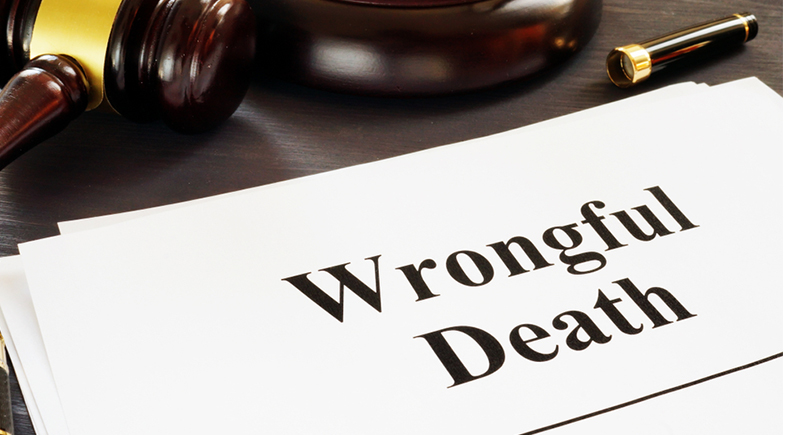The wrongful death definition is when someone dies at the fault of another person or entity. It can be accidental or due to the negligence or misconduct of the other party and is not considered criminal. In fact, wrongful death lawsuits play out in civil court, most often after a criminal trial for the same incident.
If you’ve recently lost a loved one and are considering a wrongful death case, here are the basic things you need to know about the process, including who can sue, who can be sued, and what you can expect to recover.
What Is Wrongful Death and Who Can Be Held Responsible?
Wrongful death is when someone dies at the fault of another person or entity – but is not necessarily criminal. Here are some examples of circumstances where wrongful death might apply:
- Car accidents. When you can prove that the death of a loved one was the result of someone else’s negligence when driving, it establishes liability and is a strong case for a wrongful death suit. These cases may result from texting while driving, speeding, and drunk or impaired driving.
- Defective products. Most consumer products fall under heavy regulation to make sure that manufacturers only sell products that are safe to consumers. If a manufacturer makes and sells unsafe products, there could be significant consequences if a death occurs as a result. Contaminated food, unsafe children’s products, or defective vehicles are some common causes of wrongful death.
- Medical malpractice. If a doctor, nurse, or member of the medical staff neglects to perform essential duties or doesn’t follow protocol and the patient dies. This falls under the definition of wrongful death. In this instance, it can result from delayed treatment, medication errors, or performing a procedure without consent.
- Truck accidents. Truck accidents are often a lot worse than car accidents because they’re so much bigger and heavier. A lot of state regulations exist for commercial semis and other vehicles requiring high insurance policy limits. If fault can be established in these cases, you may be able to recover a lot in wrongful death damages. Distracted and impaired driving often plays a part in these accidents. Additionally, driver exhaustion often plays a role because truckers spend long hours on the road making deliveries over long distances.
- Swimming pools and other water-related accidents. If pools and water parks aren’t properly maintained or if lifeguard staffing isn’t adequate and death occurs, the facility can be held responsible.
How Can a Wrongful Death Claim Be Proven?
Successful wrongful death cases have to include the following:
- The death of a human being
- Proof that the death occurred because of another person’s negligence, with or without intent
- Family members who are suffering financially as a direct result of the person’s death
If all three of these apply, you likely have a chance at a successful wrongful death suit. Consider contacting a wrongful death lawyer to recover damages to avoid financial hardship.
If you’re filing a wrongful death lawsuit, it’s important to get a lawyer who specializes in this type of law. These cases typically take a lot of time. Your lawyer should have as much experience as possible to make sure the case progresses as smoothly as possible and you receive the financial compensation you deserve.
While nothing replaces a loved one, there are very practical reasons why a wrongful death suit may be warranted. You will most likely need financial compensation to help cover the costs relating to medical expenses, funeral and burial expenses. All of these things pile on top of the pain and suffering that comes with losing a loved one.
What Does a Wrongful Death Attorney Do?
The first thing a wrongful death lawyer does is research any available facts in detail. This includes speaking with on-scene witnesses, consulting expert witnesses, and examining any applicable insurance policies of the person at fault.
After laying out the groundwork of the case, your lawyer is likely to review case law. Laws are laws, but it is often the precedent of how judges have interpreted that law in the past that apply to your case. This helps your lawyer form the argument for your case and come up with a solid strategy to win based upon precedent.
If it’s clear from the evidence that a wrongful death did occur, your lawyer will attempt to negotiate a settlement. This could be with the accused’s insurance company or directly with their attorney. Large businesses with the financial means to fight a lengthy lawsuit may choose not to settle, but if the case evaluation for liability is clear, a settlement this early in the process is possible.
If the defendant doesn’t settle, then the case moves forward. At this point, your lawyer files an official complaint with the court and presents it to the defendant. The defendant can file a motion to dismiss or appeal or they can request a stay which essentially means putting the case on hold. This is also when discovery begins, and both sides get access to all relative evidence.
If the evidence and case you lawyer built is strong, the case continues until it’s time to go to trial. This is another critical point that the defendant may offer to settle if it looks like there’s enough evidence to persuade the jury to rule in your favor.
If they don’t settle at this point, then the case goes to trial. At trial, the defendant may try to have certain pieces of evidence excluded or attempt to have the case dismissed.
Get What You Deserve
Hiring the right attorney is essential to getting the wrongful death settlement you deserve. While the process can be long, if you know that another party was to blame and have the evidence to back it up, there’s a good chance your lawyer will be able to win the case or negotiate a settlement.
If you’ve already been through a criminal case and the defendant was found guilty, it can help your civil case.
On the other hand, if the defendant was cleared from criminal charges, it’s still worth consulting an attorney because they still may be to blame for the wrongful death.
It’s important to remember that a wrongful death case is not a criminal trial and, therefore, the burden of proof isn’t quite as high. Just because the defendant was found innocent in criminal court does not mean that a civil trial will go the same way. In fact, it often doesn’t.















